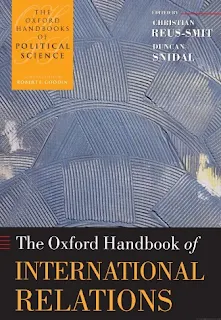 |
| The Oxford Handbook of International Relations |
DESCRIPTION:
Introduction
International relations (IR)
is a dynamic and complex field that seeks to understand the interactions,
conflicts, and collaborations between states, international organizations,
non-state actors, and individuals on the global stage. To navigate this multifaceted
domain effectively, one needs a comprehensive and authoritative resource.
"The Oxford Handbook of International Relations" is precisely that—a
monumental work that serves as an indispensable guide to the study of
international relations. This comprehensive handbook, edited by leading
scholars in the field, offers a thorough exploration of the key concepts,
theories, debates, and trends within international relations. In this detailed
review, we will delve into the various aspects that make this handbook
exceptional.
Multidisciplinary Approach: A
Holistic Understanding of IR
The strength of "The
Oxford Handbook of International Relations" lies in its multidisciplinary
approach. IR is a multifaceted field, and this book embraces this complexity by
drawing contributions from leading experts in various related disciplines,
including political science, international law, history, economics, sociology,
and more. This multidisciplinary perspective ensures that readers gain a
well-rounded understanding of international relations, considering it from a
range of angles. By integrating various viewpoints and methodologies, the
handbook addresses the intricate, interconnected issues that characterize
international politics.
Comprehensive Coverage:
Encompassing the Breadth of IR
The book offers extensive
coverage of the subject matter, encapsulating a vast array of topics and
issues. It encompasses both traditional and contemporary subjects, making it a
valuable resource for individuals at all levels of familiarity with the field.
These subjects include international security, international political economy,
international organizations, global governance, conflict resolution, human
rights, environmental issues, and more. This broad spectrum of coverage ensures
that readers have a one-stop reference for a diverse range of subjects within
the field.
Cutting-Edge Research: A
Window into the Latest Developments
"The Oxford Handbook of
International Relations" incorporates the latest research and developments
in the discipline. It includes chapters that explore emerging issues, such as
the impact of technology on international relations, the dynamics of global
health crises, the intricacies of environmental sustainability, and the
complexities of international migration. This up-to-date information ensures
that readers are well-informed about the most pressing global challenges. It
also highlights the evolving nature of international relations and emphasizes
the relevance of IR in addressing contemporary global issues.
In-Depth Analysis:
Understanding the Nuances
Each chapter in the handbook
provides in-depth analysis of key concepts, theories, and debates in
international relations. The authors not only introduce the fundamental ideas
but also critically assess their evolution and relevance in the contemporary world.
This critical approach encourages readers to engage with the material and
understand the nuances of different perspectives. In doing so, it provides a
solid foundation for scholarly inquiry and critical thinking, allowing readers
to engage with the complexities of global politics.
Global Perspectives: Embracing
Diversity in IR
Recognizing the diverse nature
of international relations, "The Oxford Handbook of International
Relations" presents a global outlook. It features contributions from
scholars and experts from around the world, offering insights and viewpoints from
various regions and perspectives. This ensures that the book does not favor any
particular school of thought or geopolitical standpoint. Instead, it reflects
the pluralistic and evolving nature of international relations, which is
essential for a nuanced understanding of the discipline.
Reference Tool: A Valuable
Resource for Researchers
While the handbook can be read
from cover to cover, it is also designed to serve as a reference tool. Each
chapter concludes with an extensive bibliography, making it a valuable resource
for researchers and students seeking to explore specific topics further. This
aids in academic research and further study within the field. The handbook,
therefore, not only offers a wealth of information but also facilitates deeper
exploration into specific areas of interest.
Accessible Language: Engaging
All Audiences
"The Oxford Handbook of
International Relations" strikes a balance between academic rigor and
accessibility. While it is written by leading scholars and experts in the
field, the authors and editors have made a concerted effort to present complex
ideas in an accessible manner. This means that the book is approachable to
students and newcomers to the field, yet it still provides depth and nuance for
experienced scholars. This commitment to clarity makes the handbook a useful
resource for a wide range of readers, from beginners to seasoned professionals.
Conclusion
"The Oxford Handbook of
International Relations" is a monumental work that serves as an essential
guide to the field of international relations. Its multidisciplinary approach,
comprehensive coverage, emphasis on cutting-edge research, global perspectives,
and commitment to accessibility make it an invaluable resource for anyone
interested in the complex world of global politics.
This handbook is not only a
reference work but also a source of inspiration for further research,
discussion, and understanding in the ever-evolving field of international
relations. Whether you are a student, an academic, a researcher, or a
practitioner in the field, this handbook is a crucial addition to your library.
It provides a rich tapestry of knowledge and insights that can help us make
sense of the intricate web of international relations, ultimately contributing
to a more informed and engaged global citizenry.
International relations is a
multidisciplinary field that covers a wide range of domains and subfields. Here
is a list of some of the key domains within international relations:
International Security: This
domain deals with issues related to national and global security, including
topics like conflict, peace, war, nuclear proliferation, arms control,
terrorism, and military strategy.
International Political
Economy (IPE): IPE examines the relationship between
politics and economics in the global arena, covering areas such as trade,
finance, development, globalization, and international economic institutions.
International Organizations: This
domain focuses on the role and functioning of international organizations, such
as the United Nations, World Trade Organization, and the International Monetary
Fund.
Global Governance:
Global governance explores how international cooperation and decision-making
processes occur and evolve to address global challenges, including issues like
climate change, human rights, and humanitarian intervention.
International Law:
International law involves the legal norms and principles that govern state
behavior in the international system, encompassing topics like treaties, human
rights law, humanitarian law, and environmental law.
Diplomacy:
Diplomacy is the practice of managing and conducting negotiations between
states to achieve international goals, involving the study of negotiation,
conflict resolution, and diplomatic protocol.
Conflict Resolution and Peace
Studies: This domain focuses on the causes and resolution of
international conflicts, the study of peacebuilding, and post-conflict
reconstruction.
Human Rights:
Human rights in international relations involve the study of the promotion and
protection of fundamental rights and freedoms on a global scale, including
issues such as genocide prevention, refugee rights, and the responsibility to
protect (R2P).
International Political Theory:
International political theory explores the philosophical and ethical
underpinnings of international relations, including concepts like sovereignty,
cosmopolitanism, and global justice.
Comparative Foreign Policy:
Comparative foreign policy analysis examines how different countries formulate
and implement their foreign policies and how these policies impact
international relations.
Environmental and Sustainable
Development: This domain addresses global environmental
challenges and sustainable development issues, including climate change,
biodiversity, and sustainable resource management.
Global Health:
Global health in international relations examines issues related to public
health on a global scale, including disease control, healthcare access, and the
impact of health crises on international relations.
Migration and Immigration: The
study of international migration and immigration involves analyzing the causes,
consequences, and policies related to cross-border movements of people.
Media and Communication in IR: This
domain explores how media, information, and communication technologies
influence and shape international relations, including topics like propaganda,
soft power, and global information flows.
Area Studies:
International relations also includes specialized area studies, focusing on the
international politics and foreign policies of specific regions such as the
Middle East, Asia, Europe, Africa, and Latin America.
These are some of the core
domains within international relations. It's worth noting that the field is
dynamic, and new areas of study may emerge as global challenges and dynamics
evolve. Researchers and scholars within international relations often work
across multiple domains to provide a holistic understanding of global politics
and cooperation.
